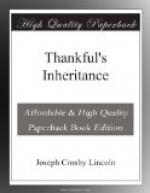Certainly she did prove herself to possess marked ability as a business manager. Quietly, and without undue assertion, she reorganized the affairs of the High Cliff House. No one detected any difference in the quality of the meals served there, in their variety or ample sufficiency. But, little by little, she took upon herself the buying of supplies, the regulation of accounts, the prompt payment of bills and the equally prompt collection of board and room rent. Thankful found the cares upon her shoulders less and less heavy, and she was more free to do what she was so capable of doing, that is, superintend the cooking and the housekeeping.
But Thankful herself was puzzled.
“I don’t understand it,” she said. “I’ve always had to look out for myself, and others, too. There ain’t been a minute since I can remember that I ain’t had somebody dependent upon me. I cal’lated I could run a boardin’-house if I couldn’t do anything else. But I’m just as sure as I am that I’m alive that if you hadn’t come when you did I’d have run this one into the ground and myself into the poorhouse. I don’t understand it.”
Emily smiled and put her arm about her cousin’s waist. “Oh, no, you wouldn’t, Auntie,” she said. “It wasn’t as bad as that. You needed help, that was all. And you are too generous and kind-hearted. You were always fearful that your boarders might not be satisfied. I have been teaching bookkeeping and accounting, you see, and, besides, I have lived in a family where the principal struggle was to satisfy the butcher and the baker and the candlestick maker. This is real fun compared to that.”
Thankful shook her head.
“I know,” she said; “you always talk that way, Emily. But I’m afraid you’ll make yourself sick. You come down here purpose for your health, you know.”
Emily laughed and patted Mrs. Barnes’ plump shoulder.
“Health!” she repeated. “Why, I have never been as well since I can remember. I couldn’t be sick here, in this wonderful place, if I tried. Do you think I look ill? . . . Oh, Mr. Daniels!” addressing the lawyer, who had just entered the dining-room, “I want your opinion, as a—a specialist. Auntie is afraid I am ill. Don’t you think I look about as well as anyone could look?”
Heman bowed. “If my poor opinion is worth anything,” he observed, “I should say that to find fault with your appearance, Miss Howes, would be like venturing to—er—–paint the lily, as the saying is. I might say more, but—ahem—perhaps I had better not.”
Judging by the young lady’s expression he had said quite enough already.
“Idiot!” she exclaimed, after he had left the room. “I ask him a sensible question and he thinks it necessary to answer with a silly compliment. Thought I was fishing for one, probably. Why will men be such fools—some men?”
Mr. Daniels’ opinion concerning his professional rival was asked a good many times during that first fortnight. He treated the subject as he did the rival, with condescending toleration. It was quite plain that he considered his own position too secure to be shaken. In fact, his feeling toward John Kendrick seemed to be a sort of kindly pity.




